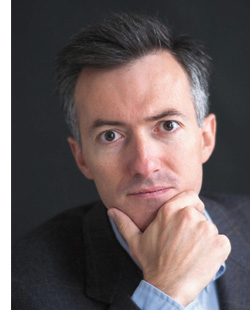
Jean-luc Doumont, a regular contributor to OPN’s career column and blog, has generously allowed us to adapt this content from his new booklet on effective communication, Traditions, templates and group leaders. You can download this free 16-pp. resource directly from Jean-luc’s website.
I have been running sessions on effective scientific communications for 20 years, and they are largely about challenging traditions. Ideally, traditions converge to best practices. But doing things “the usual way” without questioning whether it is the most effective method is hardly a guarantee of success. Critical thinking is as useful for communication as it is for research.
Here, I take a look at some ineffective traditions and myths in conference talks and scientific writing.
Opening a talk with the speaker’s name and presentation title. At the start, attendees want to decide whether it is worth staying. The speaker must thus first of all create interest and establish credibility. A self-centered opening is unlikely to achieve either, and the name and title of the talk are usually on screen.
Going over the preview of the talk at the very start. Attendees are not ready to assimilate such a preview until they know what the talk is all about. They first need to know the research need, how the speaker went about it, and his or her main message. The preview should outline the body (just before it), not the whole talk.
Thanking attendees for their attention. Thanking attendees suggests they paid attention as a favor. If you wish to show respect, make the talk interesting for them. Get their attention, motivate them and adapt to them. Make them want to thank you.
Writing a highly specialized abstract for a paper. Usually, the abstract is read by everyone, including the least expert readers, whereas the paper itself is read by more expert readers, who want details. While short, abstracts should not be overly technical. They should focus on the motivation and outcome.
Putting up with bad talks because conferences are supposedly more about networking. Networking can admittedly be a significant benefit of conferences. Still, talks should incite networking, not hinder it by reflecting poorly on the speakers or obscuring their topics. As for other things in life, if talks are worth doing, they are worth doing well.
Using “scientific language.” A tenacious yet often subconscious myth suggests that scientific prose requires a specific, unique writing style: “scientific language.” Group leaders are even known to criticize papers that “do not sound scientific enough,” as if credibility depended on obfuscation. If colleagues are grateful when you explain your research straightforwardly to them, why would you need to write differently, except to polish an imperfect use of the language?
Insisting on the passive voice (or the active one). Should research be reported in the passive voice? Certainly not when it makes for heavier sentences or omits an agent that matters, as in it is believed. Who believes this? The authors? The community at large? Readers will want to know. Should you write every sentence in the active voice? Of course not. The passive has legitimate uses as well, in particular to place the topic in subject position. Absolutes are convenient, but they are seldom tenable.
Do not let traditions stand in your way: Research is not about fostering mediocrity. Question habits. Identify ends before discussing means. In my experience, the scientific community accepts what is different if it is manifestly more effective.
Jean-luc Doumont (jl@principiae.be) holds a Ph.D. in applied physics from Stanford University. He now devotes his time and energy to training researchers and others in effective communication. He is a traveling lecturer for OSA.
